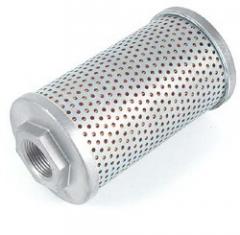The increase in the distinction of hydraulic systems and related elements has in turn increased the significance of its maintenance. Conceivably, the most economical and easiest way to bring down the maintenance costs of Clark forklifts and ensure consistent operation is by proper hydraulic filtration. This article discusses everything you need to know about forklift hydraulic systems, especially hydraulic filters.
Nowadays, forklift trucks are used in high pressure environments and for complicated operations than ever before, inducing high system stress and greater susceptibility to contamination. Most forklift hydraulic system failures happen due to contaminants, which can have adverse impact on the system in different ways, some of which include:
- Internal leakage, lowering cylinder, motor and pump efficiency, and also diminishing the valves’ ability to manage pressure and flow.
- Corrosion caused by acids that are produced due to the fusion of discordant fluids and fluid breakdown.
- Coherence of parts due to silts or sludge.
- Breakdown of components due to accumulation of large amounts of contaminants.
As you would have intense demands for your hydraulic systems, you should include proper filtration to maintain system cleanliness, through which you can attain optimum reliability and efficiency. There are several factors to be taken into account when selecting a hydraulic filter for your Clark forklift:
- The hydraulic system’s operating pressure and the fluid type used.
- The filter’s resistance to fluid flow.
- The level of flow necessary for the system’s functioning.
- The level of fluid cleanliness needed for a particular application.
- The filter’s ability to hold required amount of contaminants.
Components
- Filter can: This is designed to endure high pressures, and are covered with baked enamel finish to protect it from corrosion and rust.
- Metal end caps: These caps prevent fluid leakage by providing additional support to the hydraulic filter media.
- Coil spring: Its curved ends prevent the can and other elements from getting damaged.
- Base plates: These are built using heavy gauge steel and comprise of internal threads to enable quick installation.
- Sealing gaskets: Gaskets are made of materials that are specially designed for usage in hydraulic filters, enduring fluid flow.
Types of Filter Media
To improve the cleanliness levels of your Clark forklifts’ hydraulic systems, and to obtain better performance, you can choose filters that use the following filter media types:
- Cellulose media: Containing natural fibers, this is the most commonly used type in hydraulic filtration systems. These fibers are enduring to pressure and flow, because of their large and variable twines. Even large contaminants are reduced on the media’s surface, confining holding capacity and improving constraints.
- Synthetic media: If your transmission or hydraulic applications are of heavy duty and high pressure, then synthetic media filters will suit you best. These are basically glass fibers and come in uniform shape and size since they are man-made. These filters are relatively expensive, but provide considerable performance benefits like: enhanced efficiency, protracted life time, and reduced restriction.
The hydraulic filter you choose should meet the following requirements:
- Efficiency: See to that the filter is efficient enough to prevent the entry of contaminants of all sizes.
- Capacity: This refers to the filter’s capacity in holding specific amounts of contaminants. Make sure the filter can hold your required amount.
Here are some basic facts you should be aware of:
- Over 70 percent of all hydraulic system breakdowns are known to happen because of contaminated fluid.
- All new hydraulic systems will have impurities left in them, which highly contaminate the hydraulic fluid during the initial operating hours. Therefore, remember to replace your forklift hydraulic filter after its initial 10 operating hours.
- System wear contamination, environmental contamination, and system maintenance contamination are other fluid contamination sources.
- Filter the new hydraulic fluid before installation, as it can also contain high levels of contamination.
- Blocked transmission filters can cause reduced hydraulic fluid flow, leading to slippage, shift issues, and other defects.
The life time of your hydraulic and transmission systems can be greatly extended by scheduling regular maintenance and replacing the hydraulic and transmission filters on your forklift trucks.
Clark has its parts distribution center located in Louisville, Kentucky and delivers parts to its dealers all across North America. If you are looking for best in quality Clark forklift hydraulic filters and transmission filters, Solid Lift Parts has a vast inventory to offer.






